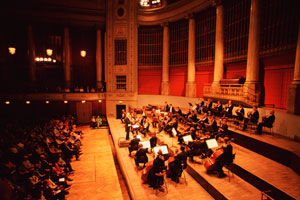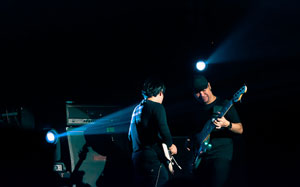LC Interpreting Services is now SignNexus!
Performing Arts Interpreters
 Imagine attending a Broadway production or Vegas show you’ve wanted to see for years. You’ve read all the rave reviews and secured great seats! But when the performance begins, it’s difficult to follow along. The actors are missing their lines and messing up the delivery, and lacking in emotion. The production you were so excited to see is confusing and completely botched. This scenario reflects the experience Deaf individuals have when a qualified Performing Arts Interpreter is not provided.
Imagine attending a Broadway production or Vegas show you’ve wanted to see for years. You’ve read all the rave reviews and secured great seats! But when the performance begins, it’s difficult to follow along. The actors are missing their lines and messing up the delivery, and lacking in emotion. The production you were so excited to see is confusing and completely botched. This scenario reflects the experience Deaf individuals have when a qualified Performing Arts Interpreter is not provided.
One hallmark of a great civilization is a rich spectrum of cultural arts. Most Americans enjoy a wide variety of entertainment– from poetry readings, to theater performances, to arena rock concerts. Deaf individuals enjoy these things just as much as hearing people, but attending entertainment events can be a real challenge. Firstly, if a deaf person who uses ASL would like to have an interpreter provided, a right protected by the Americans with Disabilities Act, they must plan at least a few weeks in advance and notify the venue that they will be in attendance. No such thing as a last minute event. Then, it is up to the venue to ensure that adequate Performing Arts Interpreters are assigned to the job.
Unfortunately, if the individual responsible for coordinating deaf access is not familiar with hiring ASL interpreters, they may not understand the value of a qualified entertainment interpreter. Performing Arts Interpreters possess a specific skill set that enable them to provide an equal entertainment experience for deaf attendees; one that truly mirrors the passion and artistry of the performance.
Qualities of Great Performing Arts Interpreters
Love of the Performing Arts
 Performing Arts Interpreters do not require any acting skills, but when an interpreter working an entertainment event is not enjoying their job, that comes through in the ASL version of the performance. From school plays to cruise ship entertainment, Performing Arts Interpreters should expect to do a little bit of everything. While it might seem obvious, it needs to be said. If an interpreter does not have a passion for live performance art, they will not be able to provide deaf consumers with the access these patrons deserve.
Performing Arts Interpreters do not require any acting skills, but when an interpreter working an entertainment event is not enjoying their job, that comes through in the ASL version of the performance. From school plays to cruise ship entertainment, Performing Arts Interpreters should expect to do a little bit of everything. While it might seem obvious, it needs to be said. If an interpreter does not have a passion for live performance art, they will not be able to provide deaf consumers with the access these patrons deserve.
Preparedness
A qualified Performing Arts Interpreter can spend days and weeks preparing for an assignment. They must understand the motivations of the performers and the emotion of the performance. They need to know the words and the story behind them. Artists have specific visions when they create; interpreters are responsible for bringing these visions to life for deaf audiences. Whether they are interpreting a pop concert or a local theater production, Performing Arts Interpreters require advance preparation to provide deaf consumers with the caliber of performance that the artist intended.
Credentials
 Just because a person in the community knows ASL does not mean they are a qualified Performing Arts Interpreter. An actor’s brother who happens to know sign language is not a suitable accommodation under the ADA, unless that brother is an RID certified interpreter with the proper training and experience to provide language services. Providing inadequate Performing Arts Interpreters takes away from the integrity of a performance, and denies deaf audiences equal access. Qualified Performing Arts Interpreters are educated, certified, and have attended a number of workshops and professional development programs to further their knowledge in the field.
Just because a person in the community knows ASL does not mean they are a qualified Performing Arts Interpreter. An actor’s brother who happens to know sign language is not a suitable accommodation under the ADA, unless that brother is an RID certified interpreter with the proper training and experience to provide language services. Providing inadequate Performing Arts Interpreters takes away from the integrity of a performance, and denies deaf audiences equal access. Qualified Performing Arts Interpreters are educated, certified, and have attended a number of workshops and professional development programs to further their knowledge in the field.
Works with a Team

Most performing arts events last a few hours. ASL interpreting is a physically and mentally engaging profession, so interpreters become gradually fatigued. If the performance is over an hour, or has multiple characters/speakers, one interpreter is not going to be sufficient. Performing arts assignments require at least two interpreters, and some theater performances will require 3 or 4 interpreters. Qualified Performing Arts Interpreters will insist on reasonable working conditions for themselves by advocating for the value of team interpreters. When an interpreter is trying to take on too many roles, or works for too long, their performance begins to slip which means deaf audiences are receiving substandard services.
Involvement with Deaf Community

It is the job of a Performing Arts Interpreter to provide access in the most efficient and clear way possible. The best method is to work with deaf theater patrons and/or deaf theater consultants to explore the optimal strategies. Performing Arts Interpreters welcome feedback from the community that helps them further develop their skill.
Performing Arts Interpreters: Subtlety
 A qualified Performing Arts Interpreter knows that his or her role is not that of a performer, and they never try to steal the show. A good entertainment interpreter will work with the venue to be sure they are adequately lit and visible for deaf audience members for the duration of the program. They will also do their best to make sure deaf audiences can still focus on the show, instead of the interpreter. Providing language services on (or near) a stage might feel like a performance, but it is an interpreter’s job to support the artistry, not divert attention away from it.
A qualified Performing Arts Interpreter knows that his or her role is not that of a performer, and they never try to steal the show. A good entertainment interpreter will work with the venue to be sure they are adequately lit and visible for deaf audience members for the duration of the program. They will also do their best to make sure deaf audiences can still focus on the show, instead of the interpreter. Providing language services on (or near) a stage might feel like a performance, but it is an interpreter’s job to support the artistry, not divert attention away from it.
SignNexus is thrilled to offer Performing Arts Interpreting services in the greater NYC area, and for remote events nationwide. From school plays to pop concerts to Broadway productions, our interpreters have the skill and experience provide equal access accommodation.
At SignNexus we believe that access to cultural arts and entertainment is a right, and we are proud to provide passionate, top quality interpreters for the Deaf & Hard of Hearing community.
Resources:







